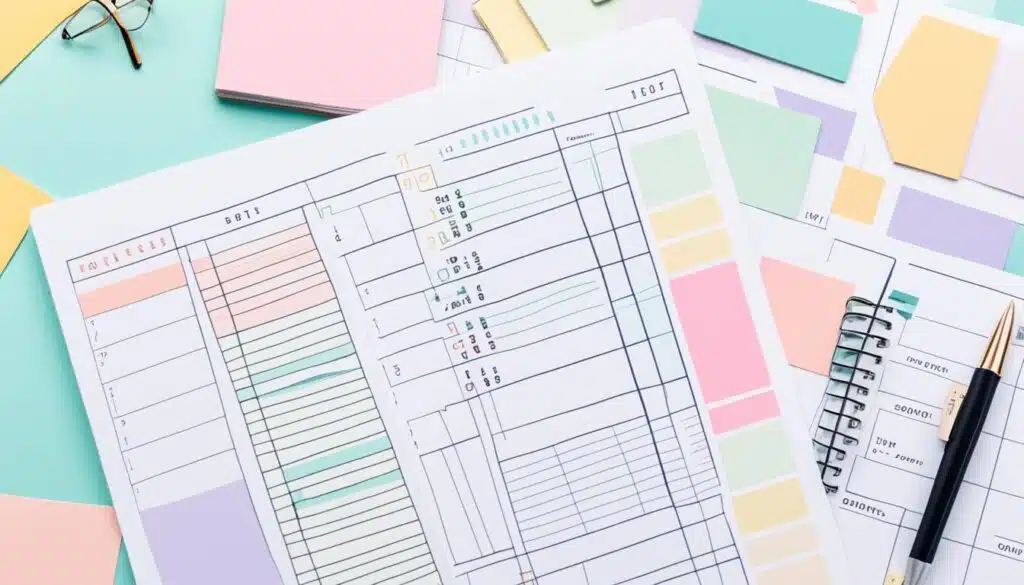Are you looking to simplify your financial life and achieve financial freedom? Look no further than a skilled finance planner. By partnering with a finance planner, you can gain the expertise and guidance needed to effectively manage your finances, budget wisely, and save for the future.
Whether you’re struggling with debt, uncertain about how to prioritize your expenses, or simply want to maximize the value of your money, a finance planner can provide practical solutions tailored to your individual needs. With their assistance, you can streamline your financial journey and pave the way to a stress-free and financially secure future.
Ready to take control of your finances and simplify your life? Read on to discover the many benefits of working with a finance planner and how they can help you achieve your financial goals.
Key Takeaways: Finance Planner
- A skilled finance planner can simplify your financial life and lead to financial freedom.
- Working with a finance planner enables effective budgeting, saving, and managing your finances.
- By partnering with a finance planner, you can receive practical solutions tailored to your individual needs.
- Expert guidance from a finance planner can help streamline your financial journey and pave the way to a stress-free future.
- Take control of your finances and simplify your life by partnering with a skilled finance planner.
The Intersection of Minimalism and Personal Finance
Minimalism and personal finance, although seemingly unrelated, converge at the intersection of value optimization. While minimalism emphasizes simplicity and the elimination of excess, personal finance revolves around making informed decisions and planning for the future. By applying minimalist principles to finances, individuals can reduce unnecessary spending, save more, and invest wisely, ultimately paving the path to financial freedom.
At its core, minimalism advocates for focusing on what truly brings joy and meaning into our lives, rather than accumulating material possessions. This philosophy encourages individuals to evaluate their spending habits and prioritize experiences and relationships over materialism. By adopting minimalist principles in personal finance, we align our financial goals with our values, allowing us to allocate our resources more intentionally.
One essential aspect of minimalism in personal finance is reducing unnecessary spending. By scrutinizing our expenses and cutting out non-essential or low-value purchases, we free up resources that can be diverted towards meaningful experiences or long-term financial goals. This deliberate approach helps us break the cycle of mindless consumerism and cultivate a more intentional relationship with money.
Furthermore, minimalism promotes the value of saving more. By embracing a minimalist mindset, we become more conscious of our consumption patterns and develop a greater capacity to distinguish between wants and needs. This awareness enables us to cultivate a habit of saving for the future, building an emergency fund, and working towards our financial goals.
Investing wisely is another key element of incorporating minimalism into personal finance. Minimalist principles guide us towards prioritizing long-term value over short-term gratification. It encourages us to invest in assets that appreciate over time, such as stocks, real estate, or retirement funds, rather than indulging in impulse purchases that provide fleeting satisfaction.
Ultimately, embracing minimalism in our personal finances empowers us to achieve financial freedom by aligning our spending, saving, and investing habits with our values. It allows us to release the burden of excessive possessions and focus on what truly brings joy and fulfillment into our lives. By making conscious choices about how we manage our finances, we can simplify our lives and create a pathway towards a more secure and fulfilling future.
Practical Tips to Incorporate Minimalism into Your Financial Life

Embracing minimalism in your financial life can bring simplicity, reduce stress, and pave the path to financial freedom. By implementing practical strategies, you can achieve a minimalist approach to budgeting, debt reduction, and investing wisely. Here are some tips to help you get started:
Create a Minimalist Budget:
Create a budget that focuses on essential categories, such as housing, transportation, food, and utilities. Eliminate unnecessary expenses and be mindful of your spending habits. By simplifying your budget, you can prioritize your financial goals and ensure every dollar is allocated intentionally.
Track Expenses Regularly:
Tracking your expenses is crucial for staying on top of your financial situation. Use a budgeting app or spreadsheet to record your purchases and evaluate where your money is going. This allows you to identify areas where you can cut back on unnecessary spending and make adjustments accordingly.
Minimize Debt:
Reducing debt is a key aspect of minimalist finance. Focus on paying off high-interest debts first, such as credit cards or personal loans. By prioritizing debt reduction, you can free up more funds for savings and investments in the long run.
Prioritize Quality Over Quantity:
When making purchases, prioritize quality over quantity. Avoid buying unnecessary items and choose products that will last longer and bring value to your life. By being selective with your purchases, you can avoid clutter and reduce the need for constant replacements.
Build an Emergency Fund:
Building an emergency fund is essential for financial stability. Aim to save at least three to six months’ worth of living expenses in an easily accessible account. This fund will provide a safety net in case of unexpected expenses or income disruptions.
Invest Wisely:
Instead of accumulating material possessions, consider investing your money in assets that appreciate over time. Research different investment options such as stocks, bonds, or real estate. Diversify your portfolio and seek expert advice to make informed investment decisions aligned with your financial goals.
Remember, minimalism is not about deprivation or sacrifice but rather about consciously choosing what brings value and joy to your life. By incorporating these practical tips, you can simplify your financial journey and move closer to financial freedom.
Debunking the Myths of Financial Planning

Many people believe that financial planning is a complicated and daunting process that requires extensive knowledge and expertise. However, the truth is that financial planning can be simplified and tailored to individual needs, helping individuals gain clarity, make informed decisions, and achieve their financial goals.
Contrary to popular myths, financial planning is not about complex strategies or inaccessible concepts. It is about simplifying your financial life, understanding your goals, and creating a roadmap to achieve them.
Financial planning is all about taking control of your finances, maximizing your resources, and making informed decisions that align with your aspirations. By engaging in financial planning, you can gain clarity, peace of mind, and control over bad buying decisions.
Key Takeaways:
- Financial planning is not complicated or inaccessible; it can be simplified and tailored to individual needs.
- Engaging in financial planning provides clarity, peace of mind, and control over bad buying decisions.
- A skilled financial planner acts as a guide and ally, offering expertise in retirement planning, investment advice, tax optimization, and risk management.
- Financial planning helps individuals gain control over their spending habits and make conscious and informed choices.
- By creating a budget, allocating funds wisely, and aligning financial habits with long-term goals, individuals can avoid regrettable impulse purchases and direct their resources towards what truly matters.
Simplifying Life: Clarity and Peace of Mind

Engaging in financial planning brings clarity to one’s financial situation, aspirations, and the steps needed to achieve goals. This clarity provides peace of mind, making it easier to tackle life’s challenges with confidence. With a well-defined plan, individuals can make informed decisions and avoid impulsive and unnecessary spending, ultimately leading to a less stressful life.
When you have a clear understanding of your financial situation, including your income, expenses, and savings goals, you can prioritize your spending and align it with your long-term aspirations. Financial planning helps you gain a holistic view of your finances, giving you the clarity you need to make sound financial decisions.
Having clarity about your financial situation also allows you to plan for the unexpected. By building an emergency fund, you can have peace of mind knowing that you have a financial safety net to fall back on during unexpected events, such as job loss or medical emergencies.
A well-thought-out financial plan provides a roadmap for achieving your financial goals. It helps you break down your goals into achievable milestones, guiding you on the necessary steps to take to reach each milestone. This clear path gives you peace of mind and confidence that you are on track to achieve your financial aspirations.
Financial planning also helps you avoid impulsive and unnecessary spending. When you have a plan in place, you can evaluate your spending decisions based on their alignment with your financial goals. This thoughtful approach gives you the clarity to distinguish between wants and needs, allowing you to make more informed choices about where to allocate your financial resources.
With clarity comes the peace of mind that you are in control of your financial future. By taking proactive steps to manage your finances effectively, such as setting a budget, tracking expenses, and saving and investing wisely, you can reduce financial stress and enjoy a more peaceful and fulfilling life.
Financial Planning: A Path to Clarity and Peace of Mind
“Financial planning gives you the clarity and peace of mind to confidently navigate your life’s financial journey.”
Gaining Control Over Bad Buying Decisions

Financial planning is an essential tool for gaining control over spending habits and making conscious and informed choices. By creating a budget, allocating funds wisely, and aligning financial habits with long-term goals, individuals can avoid regrettable impulse purchases and instead direct their resources towards what truly matters.
One of the key aspects of financial planning is creating a budget. A budget helps individuals track their income and expenses, providing a clear picture of their financial situation. By carefully monitoring expenses and ensuring that spending aligns with predetermined goals, individuals can exercise control over their financial decisions and avoid unnecessary purchases driven by impulse.
Financial planners play a crucial role in helping individuals develop effective strategies for controlling their spending. With their expertise and knowledge, financial planners can provide valuable insights and solutions tailored to individual circumstances. They can analyze spending patterns, identify areas where adjustments can be made, and offer guidance on how to prioritize spending based on long-term goals.
“By aligning your financial habits with your goals, you can overcome the lure of impulse purchases and make choices that lead to financial security.”
By gaining control over bad buying decisions, individuals can take charge of their financial future. It allows them to avoid the pitfalls of impulsive spending, such as accumulating unnecessary debts or depleting their savings. Instead, individuals can allocate their financial resources towards achieving their long-term goals, whether it’s saving for retirement, buying a home, or pursuing their passions.
Financial planning empowers individuals to make conscious decisions about their money, enabling them to lead a more financially secure and fulfilling life.
The Best Budget Planners to Simplify Your Financial Journey

Managing your finances can sometimes feel overwhelming, but it doesn’t have to be. With the right tools and strategies, you can simplify your financial journey and gain control over your money. One essential tool to assist you in this process is a budget planner. Budget planners help you track your expenses, stay organized, and achieve your financial goals.
There are numerous budget planners available, each offering unique features to suit individual needs. Whether you prefer a physical planner or a digital app, you can find the perfect fit for your financial journey. With a budget planner, you can easily track your income, monitor your expenses, and make informed decisions about your spending.
Key Takeaways:
- Budget planners are valuable tools to simplify your financial journey.
- They help you track expenses and stay organized.
- With a budget planner, you can make informed decisions about your spending.
- There are various options available, including physical planners and digital apps.
- Using a budget planner ensures you can achieve your financial goals.
What Are Budget Planners?

Budget planners are essential tools for financial organization and tracking money. They provide individuals with a clear overview of their income and expenses, helping them stay organized and in control of their finances. These planners allow users to record their budget, track the money going in and out, and make informed decisions about spending and saving.
Customization options make budget planners adaptable to individual preferences. Whether someone prefers weekly or monthly sheets, needs space for specific categories, or has unique tracking requirements, budget planners can be tailored accordingly. With their user-friendly design and practical features, budget planners simplify the process of managing personal finances and achieving financial goals.
Benefits of Budget Planners
Using a budget planner offers several advantages:
- Financial Organization: Budget planners help individuals organize their income, expenses, and financial obligations in one place, providing a comprehensive overview of their financial situation.
- Better Money Management: By tracking their spending and income, individuals can identify areas where they can cut back, allocate funds wisely, and prioritize their expenses.
- Expense Tracking: Budget planners make it easy to track expenses and analyze spending patterns. This helps individuals identify areas where they can save and make necessary adjustments to their budget.
- Setting and Achieving Financial Goals: With a budget planner, individuals can set realistic financial goals and track their progress, ensuring that they stay on track and achieve their desired outcomes.
- Savings: Budget planners encourage individuals to allocate a portion of their income towards savings, ensuring that they are consistently building their financial safety net.
A Sample Budget Planner
Here’s an example of a budget planner that combines simplicity with comprehensive financial tracking:
| Category | Allocated Amount ($) | Actual Amount ($) | Difference ($) |
|---|---|---|---|
| Housing | 1000 | 950 | +50 |
| Utilities | 200 | 190 | +10 |
| Transportation | 300 | 280 | +20 |
| Groceries | 400 | 410 | -10 |
| Entertainment | 200 | 180 | +20 |
| Savings | 500 | 520 | -20 |
The sample budget planner above provides a clear breakdown of different expense categories, the allocated amount for each category, the actual amount spent, and the difference between the allocated and actual amounts. This helps individuals visualize their financial progress and make necessary adjustments to their spending habits.
When using a budget planner, it’s important to review and update it regularly to reflect any changes in income, expenses, or financial goals. By consistently tracking their money and staying organized, individuals can effectively manage their finances and work towards achieving financial stability and success.
Why Should I Use a Budget Planner?

When it comes to money management and achieving financial goals, using a budget planner is absolutely crucial. Budgeting provides individuals with a clear roadmap for their finances, helping them effectively cover their bills, save for future expenses, and ultimately find peace of mind. With a budget planner, you can take control of your financial journey and make informed decisions about your spending and saving habits.
A budget planner allows you to plan for your cash flow, ensuring that you always have enough to cover your essential expenses and also set money aside for important milestones, such as vacations or retirement. By creating a comprehensive budget, you can avoid the stress and strain of living paycheck to paycheck and gain a clearer understanding of your financial situation.
Not only does a budget planner help you manage your money, but it also enables you to prioritize your financial goals. Whether you want to pay off debt, save for a down payment on a house, or build an emergency fund, a budget planner allows you to allocate your resources in a way that aligns with your aspirations. By assigning specific amounts to each goal, you can track your progress and make adjustments when needed.
Benefits of Using a Budget Planner:
- Efficient money management
- Clear overview of income and expenses
- Tracking and categorizing expenses
- Setting and achieving financial goals
- Reducing financial stress
- Improved decision-making
By utilizing a budget planner, you gain control over your finances and ensure that your hard-earned money is being put to good use. No longer will you feel overwhelmed or uncertain about your financial situation. Instead, you’ll have a sense of direction and purpose, knowing exactly where your money is going and how it’s helping you achieve your long-term goals.
Your budget is your roadmap to financial success—every dollar has a purpose.
| Popular Budget Planners | Features |
|---|---|
| The Budgeting Binder | Monthly and weekly sheets, expense tracking, debt reduction planning |
| The Extra Income Budget | Goal setting, income tracking, expense categorization |
| BoxClever Press Budget Planner | Monthly and weekly layouts, savings planning, bill organization |
| Your Balanced Monthly Budget Planner | Income and expense tracking, goal setting, savings planning |
| Mead Organizer Expense Tracker | Monthly overview, expense tracking, financial goal setting |
| Limitless Mindset Budget Planner | Expense tracking, goal setting, debt reduction planning |
The Benefits of Using a Budget Planner

A budget planner is an invaluable tool that can bring significant benefits to your financial journey. By implementing a budget planner in your financial routine, you can achieve financial organization, enhance money management skills, track your expenses, set and achieve financial goals, and save for the future.
When using a budget planner, you gain a clear and comprehensive view of your income and expenses. This clear visualization allows you to identify areas where you can cut back on unnecessary spending, allocate your funds wisely, and prioritize your expenses. With this level of financial organization, you can ensure that your bills are consistently covered, your savings are growing, and you attain long-term financial stability.
Key Benefits of Using a Budget Planner:
- Financial Organization: A budget planner helps you maintain an organized financial structure by keeping track of your income, expenses, and financial obligations.
- Better Money Management: With a budget planner, you gain a deeper understanding of your cash flow, enabling you to make informed decisions and manage your money more efficiently.
- Expense Tracking: By diligently recording your expenses in a budget planner, you can monitor your spending habits, identify potential areas for improvement, and stay accountable to your financial goals.
- Setting and Achieving Financial Goals: A budget planner serves as a roadmap for your financial aspirations. By setting realistic and measurable financial goals, you can track your progress and steadily work towards achieving them.
- Saving for the Future: Budget planners promote regular savings by budgeting a portion of your income towards savings. This disciplined saving approach allows you to build a financial cushion that can support your future endeavors and provide peace of mind.
| Popular Budget Planners: |
|---|
| The Budgeting Binder |
| The Extra Income Budget |
| BoxClever Press Budget Planner |
| Your Balanced Monthly Budget Planner |
| Mead Organizer Expense Tracker |
| Limitless Mindset Budget Planner |
These budget planners offer various design options, including monthly and weekly sheets, expense tracking features, debt reduction planning, and goal setting capabilities. Choose a budget planner that suits your preferences and aligns with your financial organization needs.
Also Read : Unlocking Financial Freedom: A Comprehensive Guide To Retirement Income Sources
Conclusion
Financial planning and budgeting are essential components of achieving your long-term financial goals and simplifying your life. By incorporating minimalist principles into your financial habits and utilizing a budget planner, you can prioritize what truly matters, reduce unnecessary spending, save more, and make wise investments.
A skilled financial planner can provide valuable guidance, helping you navigate the complexities of financial planning and make informed decisions for your future. Their expertise in retirement planning, investment advice, tax optimization, and risk management can significantly impact your financial well-being.
By taking control of your finances with the help of a budget planner and the guidance of a skilled financial planner, you can embark on a rewarding journey towards financial freedom. Through careful financial planning, budgeting, and disciplined saving, you can achieve your financial goals, eliminate stress, and enjoy a more secure and fulfilling life.
FAQs
Q: What is the importance of having a skilled finance planner?
A: A skilled finance planner can help you take control of your money, reach your financial goals, and effectively manage your expenses and savings.
Q: How can a finance planner simplify my life?
A: A finance planner can simplify your life by providing tools such as monthly budget trackers, expense sheets, and budget planners to help you organize and manage your finances.
Q: What is the benefit of using a monthly budget planner?
A: A monthly budget planner helps you track your expenses, manage your bills, and stay on top of your financial commitments, ultimately giving you better control over your money.
Q: How can I effectively track my expenses and bills?
A: You can effectively track your expenses and bills by using tools such as budget notebooks, bill trackers, and expense trackers to manage your spending and financial obligations.
Q: What are some popular tools for managing finances?
A: Popular tools for managing finances include budget books, Erin Condren planners, financial budget planners, and expense tracker notebooks designed to help you stay organized and in control of your money.
Q: How does a skilled finance planner help with debt management?
A: A skilled finance planner can assist with debt management by providing debt trackers, budget planners, and financial organizers to help you take control of your debts and manage them effectively.
Q: What are the features of a good expense tracker notebook?
A: A good expense tracker notebook should have features such as printable templates, budget planner templates, and tools to help you manage your money and reach your financial goals.
Q: How can a budget tracker assist in reaching financial goals?
A: A budget tracker can assist in reaching financial goals by providing a clear overview of your expenses, enabling you to make informed financial decisions and improve your budget management.
Q: Are there any specific planners for women to manage finances?
A: Yes, there are specific planners such as Clever Girl Finance budget planners and GoGirl budget planners designed to help women take control of their money and manage their finances effectively.
Q: What are the benefits of using an organizer with expense tracker notebook?
A: An organizer with expense tracker notebook provides the benefit of managing your money effectively, helping you stay organized, and start managing your finances at any time without being restricted to a specific date or timeframe.





